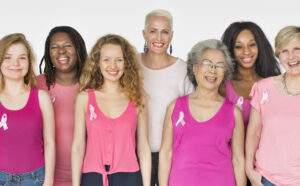Important Traffic Notice: Due to road construction on Southwest Highway directly in front of our Chicago Ridge location, traffic may be heavier than usual. Please plan ahead and allow extra time to arrive safely. Thank you for your patience and understanding!
As a woman, you are automatically at risk for acquiring breast cancer. In fact, 1 in 8 American women are estimated to develop breast cancer during their lifetimes, according to the National Cancer Institute. While there is no guaranteed way to completely prevent breast cancer, there are steps you can take to reduce your risks.
Breast Cancer Risk Factors And Prevention Methods
A risk factor is anything that increases your likelihood of developing cancer. Some people that have several risk factors never develop cancer, others with no known risk factors may receive a diagnosis. Not all risk factors can be controlled, but those that involve personal lifestyle choices can be changed.
Breast Cancer Risk Factors You Can't Control
- Age. Women ages 55 and older have the highest risk of developing invasive breast cancer.
- Family history of breast cancer or known inherited gene mutations. Only a small percentage of breast cancer is hereditary. You may consider genetic testing if any women in your immediate family have been diagnosed with breast cancer.
- Race and ethnicity. White women are more likely to develop breast cancer than black women. However, black women younger than 45 years of age are more susceptible to developing the disease than white women. Women of Ashkenazi or Eastern European Jewish heritage also have an increased risk of breast cancer because they are more likely to have inherited a BRCA gene mutation.
- Dense breast tissue. This type of tissue makes it more difficult to detect cancer from a mammogram screening.
- Reproductive history. Menstruation before ages 11 or 12 or menopause after age 55 puts women at a somewhat higher risk of breast cancer. This is because breast cells have been exposed to estrogen and progesterone for a longer time.
RELATED READING:
5 Ways to Reduce Your Breast and Ovarian Cancer Risk When You're BRCA Positive
Read Now
Breast Cancer Risk Factors You Can Control
- Alcohol consumption. Your risk of developing breast cancer increases based on how much alcohol you drink. To reduce your risk, the American Cancer Society recommends no more than 1 drink a day for women (2 a day for men).
- Weight. Being overweight or obese after menopause increases your breast cancer risks. Excess fat is associated with increased blood insulin levels and increased estrogen levels in women, both of which have been associated with breast cancer. If you need or would like to lose weight, talk to your doctor about healthy ways to do so.
- Birth control. Certain forms of birth control (including oral contraceptives) have been linked to a slightly higher risk of developing breast cancer. To reduce this risk, talk to your doctor about other forms of non-hormonal contraception (such as IUD or condoms).
- Timing and frequency of pregnancy. Not everyone can control the timing and frequency of their pregnancy. When possible, however, you may consider having your first child before age 30. According to the American Cancer Society, women who have a baby before 30 and women with multiple children have a slightly lower risk of breast cancer.
- Breastfeeding. This may not be an option for you, but if it is, breastfeeding for at least a year can reduce your risk of developing breast cancer, regardless of what age you have the child.
Again, it’s important to understand that having one or more of these risk factors does not necessarily mean that you will develop breast cancer. Regardless, it is wise to know what the potential risks are so you can take charge of your health, starting with regular breast cancer screenings. The earlier breast cancer is detected, the better the outcome. If you are at high risk, talk to your primary physician or gynecologist about starting your breast cancer screenings a bit earlier than the standard recommendation.